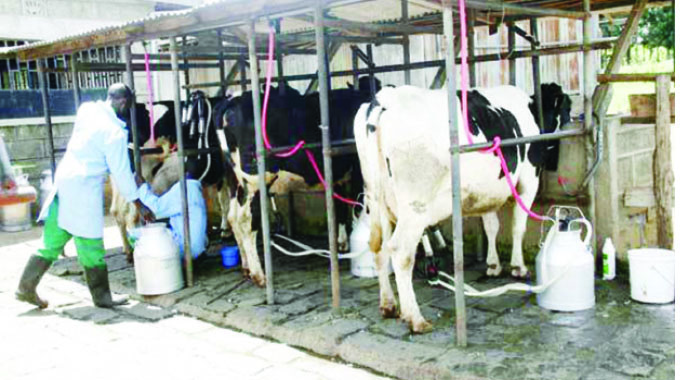Dairibord partners USAID to enhance milk production

Business Reporter
Dairibord Zimbabwe recently entered into a co-funded grant agreement with a unit of USAID to increase raw milk supply through establishing a reliable supplier base from smallholder beef-dairy farmers.
Specifically, the Zimbabwean dairy company will implement the initiative in partnership with the USAID-funded Feed the Future Zimbabwe Fostering Agribusiness for Resilient Markets (FARM) Activity.
In a statement after the signing ceremony, the partners said the programme’s objectives would be achieved using village milk aggregators in wards three, four, and 16 of Chipinge District in Manicaland.
The grant intends to establish three new village milk aggregators, with the potential to collaborate with 150 additional beef-dairy cattle farmers.
Under the partnership, Dairibord will invest in cold chain trucks to transport the milk from the farmers, improving the quality and quantity of milk that it is supplied with.
Speaking at the signing ceremony, Dairibord’s milk supply development executive Mr Evert Oostindiën, affirmed the merits of milking beef cows by highlighting that “milk from traditional/ indigenous breeds has higher butterfat content as these cows produce lower yields”.
He said if beef-dairy farmers were equipped with the requisite knowledge and skills, they would produce and supply raw milk to a village milk aggregator that bulks volume to achieve economies of scale and lower the cost of transporting the milk to the processing plant while minimising milk contamination.
Feed the Future Zimbabwe FARM activity’s chief of party Kudakwashe Ndoro said, “By relying on smallholder farmers as a supply source of raw milk to Dairibord, this will not only make shareholders happy due to the lowered risk to milk supply, but will have a transformative multiplier effect in communities as the model will be replicated once other community members learn of this partnership and see how other community peers are supplying milk.”
The enhanced milk value chain will potentially result in an additional 100 beef-dairy producers joining the current cohort of 75 beneficiaries who supply milk to the five established village milk aggregators.
The beef-dairy and village aggregation models will enable smallholder farmers to gradually transition into fully-fledged commercial dairy farming, benefiting from training on dairying with beef cattle and good business practices.
Complemented with technical assistance and training from Dairibord, the introduction of improved, high-yielding breeds through an artificial insemination programme, and the growth of on-farm feed, the partnership is poised to enhance the viability of commercial production of clean milk by smallholder beneficiaries.
It will increase incomes, nutrition security, and hygiene for many of the rural households in the Chipinge district.
Dairibord said it was committed to the development of small-scale dairy farmers for participation in national raw milk production and in support of the indigenisation agenda.
The company works with over 480 small-scale farmers, of which 40 percent are women, who supply the dairy processor through 13 milk collection centres around the country.
Small-scale farmers currently supply 4 percent of the company’s raw milk intake, a figure expected to double with continued support from such initiatives.
Cumulatively, the proposed programme is targeting 325 beef-dairy farmers in Chipinge over 12 months.
In 2023, the country’s milk output experienced commendable growth, reaching 99,8 million litres, a 9 percent increase from the prior year’s 91,4 million litres.
This marked the third consecutive year of growth in milk production, underscoring the Zimbabwe dairy sector’s resilience and the success of strategic initiatives to boost milk output.









Comments